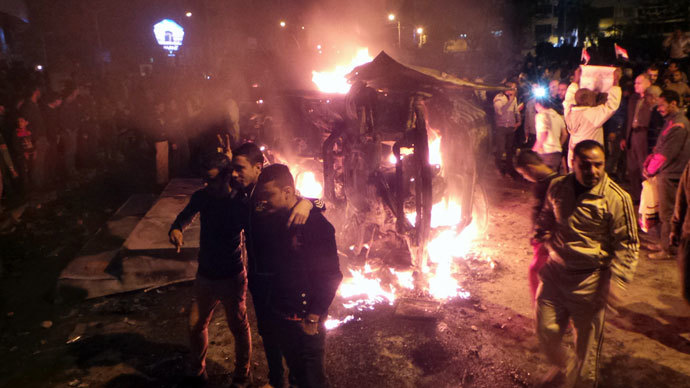'Egypt returns to pre-2011 situation'

Egyptian people believe the labeling of the Muslim Brotherhood as terrorist, the imprisoning of protest leaders, and the crackdown on dissent, has returned the country to a police state worse than under Mubarak, journalist Shahira Amin told RT.
RT:They deny it, but do you believe the Muslim Brotherhood would carry out such terrorist attacks?
Shahira Amin: The Muslim Brotherhood have already denied any involvement in that attack, they issued a statement saying that they were not behind the attack and asking for an investigation so that the perpetrators of the crime could be brought to justice. However, the fingers have been pointed at them again despite a jihadist group Ansar-Jerusalem claiming responsibility for this suicide car bombing.
RT:What's the government trying to achieve by labeling the Muslim Brotherhood a terrorist organization?
SA: This is a new escalation in a long-running feud between the security state and the Muslim Brotherhood. What they are trying to achieve is to destroy the Islamist group all together, and not to leave any room, any space for that group to enter into political life again. Declaring the Muslim Brotherhood a terror group will mean criminalizing their activities, criminalizing their financing and also criminalizing their membership. The protests are already outlawed, so this is a new escalation, it’s another repressive measure against them, the leaders are already behind bars and thousands of their supporters languish in prisons, there have been claims that some have been tortured and not allowed visits by their families. This can lead to more violence because violence can only breed violence.
RT:Their supporters that are not in prisons, can they be called terrorists too? The Muslim Brotherhood in its day had big support, now they are told they are supporting a terrorist group.
SA: Absolutely. They are not allowed to be members anymore. If they have been given this chance to abandon the group and then be accepted into the mainstream society again, that is a proposal that the government is making. But they seem more defiant than ever, they have already called for protests this Friday saying that the coup is the real terrorism here. So I expect more violence, more bloodshed and it’s a vicious circle.

RT:Won't this development potentially radicalize the Muslim Brotherhood even further?
SA: The latest decision to declare the Muslim Brotherhood a terrorist group can only mean isolating them further. They are very much part of this society, but now this is a deeply polarized, bitterly divided country and I’m afraid that this latest decision will marginalize the group even more. They seem very defiant; they have already declared new protests this coming weekend, although they are outlawed under this new law regulating protests. It can only mean a further crackdown on the group. Although the group has been used to these repressive measures, this is even worse than it was for them under Mubarak, when they were outlawed but tolerated.
RT:Egypt was one of the first to go through the Arab Spring revolution - what is keeping the protests alive there?
SA: Initially it was pro-Morsi supporters taking to the streets, demanding the reinstatement of the Islamist president. But in recent weeks we’ve seen revolutionary activists drawn into the protests. That happened after a brutal crackdown on a protest in which young activists took part, they were protesting the new anti-protest law, which they say will limit freedom of expression and assembly. Now several symbols of the revolution have been detained and three of them have been sentenced to three years in prison.
Also there’s a crackdown on protests at the universities in which one student was killed at Cairo University two weeks ago. That has created a lot of anger. People are angry at the excessive use of force, the inability for them to express their grievances. After the revolution they had made some gains. The fact that they were able to express their demands, to take to the streets and organize protests, and now with the new law these protests have been banned. They feel that this is a return to pre-January 2011, the return of the police state, repressive measures are being taken, and all measures are taken to silence this form of dissent. And that is why many of the young revolutionaries are also joining the protests.
The statements, views and opinions expressed in this column are solely those of the author and do not necessarily represent those of RT.
The statements, views and opinions expressed in this column are solely those of the author and do not necessarily represent those of RT.












